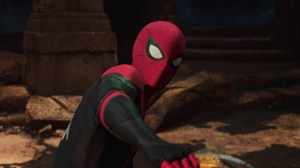Terry Jones, a founding member of iconic British comedy troupe Monty Python, has revealed to The Guardian that he has been diagnosed with primary progressive aphasia, a form of dementia which affects his ability to communicate.
Videos by ComicBook.com
Confirmation came through a spokesperson, who says the comedian is no longer able to give interviews.
Jones directed the feature films The Life Of Brian and Monty Python’s The Meaning Of Life, and co-directed Monty Python And The Holy Grail with Terry Gilliam.
Yesterday, actor Terence Bayler, who played a minor role in The Life of Brian, passed away.
The Guardian reports Bafta Cymru had announced Jones was being given a special award for outstanding contribution to film and television, and that’s when a spokesperson came forward to explain why the 74-year-old wouldn’t be able to talk about it.

“Terry has been diagnosed with primary progressive aphasia, a variant of frontotemporal dementia. This illness affects his ability to communicate and he is no longer able to give interviews. Terry is proud and honoured to be recognised in this way and is looking forward to the celebrations,” said the statement.
“We are deeply sorry to hear about Terry Jones’s diagnosis of dementia and are thinking of Terry and his family during this time,” said Kathryn Smith, director of operations at Alzheimer’s Society. “Alzheimer’s Society is here for anyone affected by dementia, and we do everything we can to keep people with dementia connected to their lives and the people who matter most by offering practical support, advice and information.”
The National Aphasia Association (via BBC) explains that primary progressive aphasia is a neurological syndrome in which language capabilities become slowly and progressively impaired.
“It commonly begins as a subtle disorder of language, progressing to a nearly total inability to speak, in its most severe stage,” the organization describes.
“We are also very much looking forward to celebrating the work of Terry Jones during the ceremony with a look back at his work from 1969 to the present day,” said Hannah Raybould, director of Bafta Cymru.








